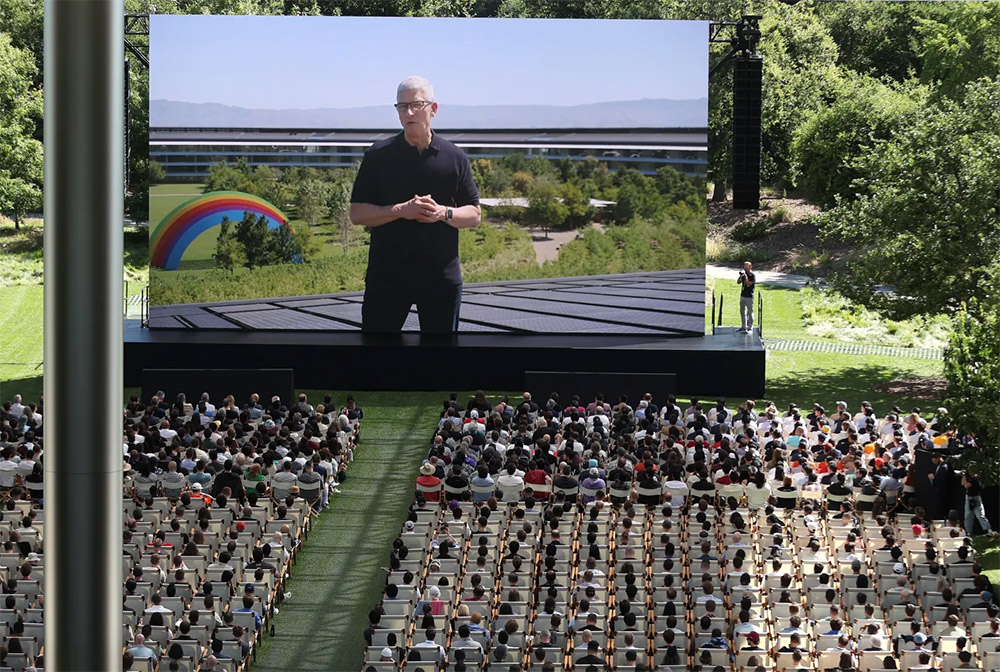
最终,苹果万众期待的AI发布可以说是非常之有苹果味。随着苹果最终发布Apple Intelligence(可谓是做到了品牌调性与该技术本身首字母的完美结合),似乎人人都领略了这家科技巨头苹果标缺失部分的美味。苹果首席执行官蒂姆·库克称该技术将彰显“个性、强大与隐私”,而且将全面地嵌入苹果的应用和硬件生态系统。
当然,苹果一直是一个密不透风的“围墙花园”,在提供周密安全举措的同时也为用户设置了大量的限制,因此Apple Intelligence也不例外。然而,正是因为苹果生态中用户的个性化环境,再加上强大的生成式人工智能,Apple Intelligence成为了或许只有苹果公司才能真正实现的技术。
在生成式人工智能前沿领域,苹果一直都不是第一,而且连边都靠不上,但该公司却押注了另一条赛道:“为普罗大众而生”的人工智能,也就是面向那些对模型、接口、数据组、图形处理器、设备、通用人工智能并不在意的数十亿用户。科技行业将这些人称之为“普通人”,他们想要的只是易用、实用、能保护隐私而且真正好用的人工智能。
苹果高管们承诺在iPhone、iPad和Mac OS设备上推出的功能清单十分冗长。Siri将获得升级,以变得“自然,更符合语境,以及更个性化。”如果Siri自己无法回答问题,那么它将询问用户是否可以求助ChatGPT(得益于苹果与OpenAI达成的新交易),而且Siri将拥有“屏幕显示内容理解能力”,最终让Siri对各大应用的用户内容做出更具类智能体特性的响应。
iOS 18、iPadOS 18和macOS Sequoia都将推出新的全系统写作工具,同时AI也将采用新的方式来帮助确定各事项(从消息一直到通知)的优先等级。其中也有很好玩的功能,例如内置的人工智能图像创作以及名字十分贴切的Genmojis,后者能够让用户随意创建定制的表情包(试想一下:用眼睛上贴着黄瓜片的笑脸表示自己在做水疗)。
但是与谷歌和Meta包罗万象的方式不同的是,后者是将生成式人工智能嵌入其产品中,苹果则另辟蹊径,在操作系统上叠加精心设计的生成式人工智能层。至少在周一的演示中,似乎没有一个是额外添加的功能(例如Meta在Instagram、Facebook和WhatsApp中的AI-is-everywhere搜索框)。事实上,这些功能都没有使用“人工智能”(AI)字眼。
对于AI一词,消费者已经听过和看过多年(而且通常听起来令人感到害怕,充满未来色彩,还有点怪异),而苹果却将其重新命名为Apple Intelligence,并让其变成了充满安全感和令人舒心的事物。在科技领域,它相当于针对敏感肌肤的温和香皂,不仅为消费者带来了一张全新的面孔,同时念起来更顺口,没有令人不悦的元素。
当然,雷声大雨点小是大型科技公司演示的通病。对于支撑Apple Intelligence功能的数据源、苹果与OpenAI有关使用ChatGPT的交易条款,以及苹果如何应对其AI反馈不可避免的幻觉等重要问题,演示中基本没有提及。毕竟,安全并不意味着“精确”。当Apple Intelligence被“放生”之后,局面必然会变得十分有意思,而且更混乱。
科技行业内卷十分严重,也在翘首期待某家公司能够驾驭AI并将其转变为行业的下一个颠覆性产品。至于这家公司是不是苹果,我们不得而知,但Apple Intelligence发布会的优雅简约必然会引起谷歌、Meta、亚马逊,当然还有OpenAI的警觉:人工智能可能十分复杂,但就像史蒂夫·乔布斯说的那样:“简约可能比复杂更难以实现:人们必须努力让自己的想法变得清晰之后才能化繁为简。”或许,人工智能公司最终还是会找到化繁为简的办法——正如乔布斯所言:“创造奇迹。”(财富中文网)
译者:冯丰
审校:夏林
最终,苹果万众期待的AI发布可以说是非常之有苹果味。随着苹果最终发布Apple Intelligence(可谓是做到了品牌调性与该技术本身首字母的完美结合),似乎人人都领略了这家科技巨头苹果标缺失部分的美味。苹果首席执行官蒂姆·库克称该技术将彰显“个性、强大与隐私”,而且将全面地嵌入苹果的应用和硬件生态系统。
当然,苹果一直是一个密不透风的“围墙花园”,在提供周密安全举措的同时也为用户设置了大量的限制,因此Apple Intelligence也不例外。然而,正是因为苹果生态中用户的个性化环境,再加上强大的生成式人工智能,Apple Intelligence成为了或许只有苹果公司才能真正实现的技术。
在生成式人工智能前沿领域,苹果一直都不是第一,而且连边都靠不上,但该公司却押注了另一条赛道:“为普罗大众而生”的人工智能,也就是面向那些对模型、接口、数据组、图形处理器、设备、通用人工智能并不在意的数十亿用户。科技行业将这些人称之为“普通人”,他们想要的只是易用、实用、能保护隐私而且真正好用的人工智能。
苹果高管们承诺在iPhone、iPad和Mac OS设备上推出的功能清单十分冗长。Siri将获得升级,以变得“自然,更符合语境,以及更个性化。”如果Siri自己无法回答问题,那么它将询问用户是否可以求助ChatGPT(得益于苹果与OpenAI达成的新交易),而且Siri将拥有“屏幕显示内容理解能力”,最终让Siri对各大应用的用户内容做出更具类智能体特性的响应。
iOS 18、iPadOS 18和macOS Sequoia都将推出新的全系统写作工具,同时AI也将采用新的方式来帮助确定各事项(从消息一直到通知)的优先等级。其中也有很好玩的功能,例如内置的人工智能图像创作以及名字十分贴切的Genmojis,后者能够让用户随意创建定制的表情包(试想一下:用眼睛上贴着黄瓜片的笑脸表示自己在做水疗)。
但是与谷歌和Meta包罗万象的方式不同的是,后者是将生成式人工智能嵌入其产品中,苹果则另辟蹊径,在操作系统上叠加精心设计的生成式人工智能层。至少在周一的演示中,似乎没有一个是额外添加的功能(例如Meta在Instagram、Facebook和WhatsApp中的AI-is-everywhere搜索框)。事实上,这些功能都没有使用“人工智能”(AI)字眼。
对于AI一词,消费者已经听过和看过多年(而且通常听起来令人感到害怕,充满未来色彩,还有点怪异),而苹果却将其重新命名为Apple Intelligence,并让其变成了充满安全感和令人舒心的事物。在科技领域,它相当于针对敏感肌肤的温和香皂,不仅为消费者带来了一张全新的面孔,同时念起来更顺口,没有令人不悦的元素。
当然,雷声大雨点小是大型科技公司演示的通病。对于支撑Apple Intelligence功能的数据源、苹果与OpenAI有关使用ChatGPT的交易条款,以及苹果如何应对其AI反馈不可避免的幻觉等重要问题,演示中基本没有提及。毕竟,安全并不意味着“精确”。当Apple Intelligence被“放生”之后,局面必然会变得十分有意思,而且更混乱。
科技行业内卷十分严重,也在翘首期待某家公司能够驾驭AI并将其转变为行业的下一个颠覆性产品。至于这家公司是不是苹果,我们不得而知,但Apple Intelligence发布会的优雅简约必然会引起谷歌、Meta、亚马逊,当然还有OpenAI的警觉:人工智能可能十分复杂,但就像史蒂夫·乔布斯说的那样:“简约可能比复杂更难以实现:人们必须努力让自己的想法变得清晰之后才能化繁为简。”或许,人工智能公司最终还是会找到化繁为简的办法——正如乔布斯所言:“创造奇迹。”(财富中文网)
译者:冯丰
审校:夏林
In the end, Apple’s highly-anticipated AI announcements were very, well, Apple-y. You could practically feel that bite in the tech giant’s fruit logo as the company finally announced Apple Intelligence (how deliciously on-brand to take advantage of the technology’s initials), which Apple’s Tim Cook touted will be “personal, powerful, and private” and integrated across Apple’s app and hardware ecosystem.
Apple, of course, has always been all about being a protective “walled garden” that provides comprehensive security measures but also plenty of restrictions for users, and Apple Intelligence will be no different. But it is that very personal context of the user within the Apple landscape, combined with the power of generative AI, that makes Apple Intelligence something perhaps only Apple could really do.
Apple has not been first, or anywhere near the cutting edge of generative AI, but it is betting on something else: An AI ‘for the rest of us’ — for the billions of users who don’t care about models or APIs or datasets or GPUs or devices or the potential for artificial general intelligence (AGI). That is, the ‘normies’ — as those in the tech industry like to call them — who simply want AI that is easy, useful, protective of privacy and just works.
The laundry list of features Apple executives promised to roll out across iPhone, iPad and Mac OS devices was long. Siri is getting an upgrade that makes the assistant “natural, more contextually relevant, and more personal.” If Siri can’t answer a question itself, it will ask the user if it’s OK to tap into ChatGPT (thanks to a new deal between Apple and OpenAI) and it will have “on-screen awareness” that will eventually allow Siri to take more agent-like action on user content across apps.
There will be new systemwide writing tools in iOS 18, iPadOS 18, and macOS Sequoia, as well as new ways for AI to help prioritize everything from messages to notifications. The fun factor is well-represented as well, with on-device AI image creation and the fittingly-named Genmojis, which let users create custom emojis on-the-fly (think: smiley face with cucumbers on the eyes to indicate you’re at the spa).
But unlike Google and Meta’s throw-everything-at-the-wall approach to integrating generative AI to their products, Apple is taking a different tack, putting a carefully designed layer of gen AI on top of its operating system. None of it, at least in Monday’s demo, seems bolted on as an afterthought (like Meta’s AI-is-everywhere search bar in Instagram, Facebook and WhatsApp, for example). And none of it, in fact, really uses the word AI as in “artificial intelligence.”
The re-branding of AI as Apple Intelligence takes a technology consumers have heard and read about for more than a year (and which has often sounded frightening, futuristic and kind of freaky), and serves it up as something that’s soothingly safe and secure. It’s the tech equivalent of a mild soap for sensitive skin, offering consumers a freshly-scrubbed face with no hard-to-pronounce and potentially irritating ingredients.
Of course, Big Tech demos are notorious for big announcements that don’t always deliver. And there were few details about important issues like the provenance of the data powering Apple Intelligence features, the terms of Apple’s deal with OpenAI for access to ChatGPT, and how Apple plans to deal with the inevitable hallucinations that will result from its AI output. After all, safe and secure does not mean “accurate.” When Apple Intelligence is released “in the wild,” things are sure to get interesting, and messier.
The tech world is in a fierce battle to see which company will be able to take AI and turn it into the industry’s next game-changer. Whether that is Apple or not remains to be seen, but the elegant simplicity of the Apple Intelligence announcements certainly puts Google, Meta, Amazon and yes, OpenAI on notice: AI may be complicated, but as Steve Jobs said, “simple can be harder than complex: You have to work hard to get your thinking clean to make it simple.” Perhaps, AI companies will finally figure out how to keep it simple—and as Jobs said, “move mountains.”






